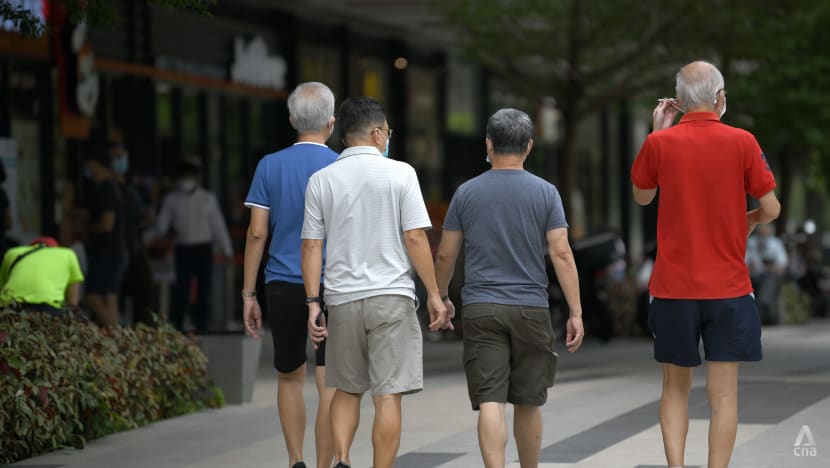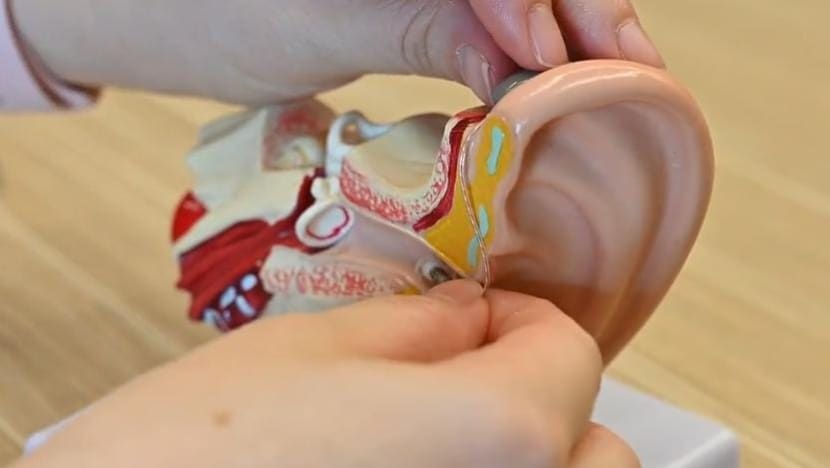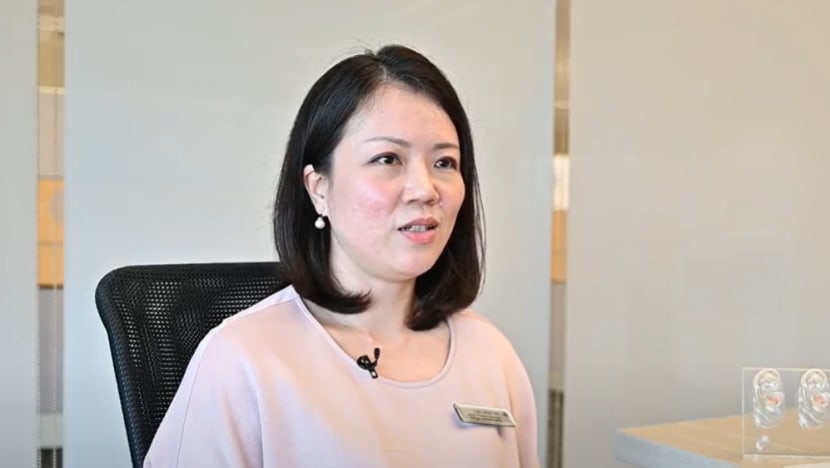Age-related hearing loss common, but seniors don't seek help for it early

A group of elderly men walking along Paya Lebar Square. (Photo: Calvin Oh/CNA)
SINGAPORE: When Ms Choy visited her parents in 2015 after moving out, she could hear the television blaring as she approached the flat from the lift.
That was the first telltale sign that something was wrong with her now 84-year-old father’s hearing. She got him tested and found he had lost about 60 per cent of his hearing.
But when he saw the cost of hearing aids, he refused to have them fitted. This was despite Ms Choy insisting that she would pay for them.
“I assured him that the cost doesn’t beat the quality of life that he’ll get. I’m ready to pay all that’s required,” she said.
With her father not getting help, his hearing progressively got worse, said Ms Choy, a 40-year-old marketing executive.
“We needed to talk to him louder and louder, till we were shouting at him,” she said. She also had trouble talking to him on the phone, as she would not be able to get a response from him despite speaking at her loudest.
He would eventually tell her to text him. Although he did not cut back on his social outings, like his weekly chess sessions with old friends, he resorted to getting them to write or text him instead of talking. When out, he would tell shopowners upfront that he could not hear, Ms Choy said.
Things changed earlier this year after he was referred to the Department of Otolaryngology - Head and Neck Surgery at National University Hospital (NUH). Ms Choy’s father was then referred to the hospital’s mobile hearing clinic, where he was assessed to have 80 per cent hearing loss and was fitted with hearing aids.
Communication with him is easier now, Ms Choy said. And in October this year, at a family wedding, his relatives were able to have a conversation with him after a long time, she said.
“Whatever (level of) hearing comes along is a delightful surprise to us,” she added.
UNADDRESSED HEARING LOSS AMONG THE ELDERLY
Her father’s case is not uncommon.
Speaking at a media event in October to announce an innovation that allows seniors to have their hearing tested in the community, Professor William Hal Martin from NUS Yong Loo Lin School of Medicine said that 93 per cent of seniors aged 60 years and above have some degree of hearing loss.
He was citing findings from Project Silver Screen, an initiative started in 2018 by the Ministry of Health and Temasek Foundation Cares to screen more seniors for hearing problems.
“What’s probably more alarming is that 61 per cent of them failed the hearing screening, indicating or suggesting the presence of a significant hearing loss,” said Prof Martin, who is from the Department of Otolaryngology.

These seniors often do not seek help immediately – the average reported time from when a person has enough hearing loss to benefit from amplification and actually getting such help is at least 10 years, Prof Martin said.
Consequences of untreated hearing loss include decreased quality of life, depression, anxiety and paranoia, accelerated brain tissue loss and an increased risk of dementia, he said.
BARRIERS TO SEEKING HELP
Several barriers prevent people from seeking help, chief among which is that the elderly – especially in Asia – often think hearing loss is part of ageing and nothing can be done about it.
Some also worry about whether they can afford hearing aids.
But with means-tested government funding available, affordability is not an issue for most seniors, chief audiologist at NUH's Department of Otolaryngology - Head and Neck Surgery Dr Jenny Loo said.

Another barrier is access – not everyone knows where and how to seek help.
On that front, three community-based hearing clinics have been set up in Pioneer Polyclinic, Tiong Bahru Community Health Centre and Singapore General Hospital Sleep Centre.
The clinics use a new boothless method developed by the hearing research team at NUS Medicine. This allows hearing evaluation to be done anywhere, instead of only in a sound-insulated booth at a hospital.
Some elderly people also have the misconception that hearing aids do not work or are noisy, which discourages them from seeking help. Dr Loo said that while the old hearing aids were indeed noisy, new ones are “quite crystal clear”.
Early detection and intervention are essential, she said. "Otherwise the brain will start to forget how sounds are like, and it will be harder to intervene with hearing devices."
How to tell if a senior has hearing loss
Seniors will typically not admit that they have hearing loss, Dr Loo said.
Their hearing loss may start with losing the ability to hear certain pitch of sounds, but still having good residual hearing to pick up other sounds. For example, they may not be able to hear certain consonants like “f” and “s” clearly but can still hear vowels well.
With everyone wearing masks, it is even harder for seniors who have hearing loss as they cannot lip-read, she said.
Principal audiologist at SGH’s ENT Centre Leem Pei Shan said seniors “hearing what they want to hear” can be one of the symptoms of hearing loss and as age-related hearing loss progress gradually over the years, this may be a cause of miscommunication between family and elderly.
Other signs include frequent mishearing, raising television volumes or seniors asking for repetition, she added.
TREATMENT FOR HEARING LOSS
Ms Leem urged family members to encourage seniors to get their hearing checked if they show signs of hearing loss.
If diseases involving the ear or hearing are detected, medical intervention will be the first step. Otherwise, a hearing aid or cochlear implant is the solution, Dr Loo said.
“Most importantly, the medical team need to devise a customised plan based on patient’s needs, degree of hearing loss and lifestyle,” she said.
President of the Hearing Professionals Association Ronald Pang said that hearing aids are modelled for varied lifestyle needs. A senior who is not very mobile and wearing the aid primarily in a quiet home setting would benefit from a “basic model” that cost a “few hundred dollars”.
More intelligent hearing aids designed for active retirees cost more, but can suppress noise better or have Bluetooth features linked to their mobile phones. Premium models also operate more effectively against echos and wind, Mr Pang said.
“The most expensive hearing aids in the premium range, designed for working adults and those with higher expectations, can cost more than S$7,000 each,” he said.
Beyond getting fitted with hearing aids, it is important to maintain them and go for a follow-up within three months of being prescribed, said senior Ear, Nose and Throat specialist at Farrer Park Hospital Dr Soon Sue Rene.
Dr Soon also stressed that there needs to be more awareness about hearing loss.
“Hearing is important for healthy ageing. It shouldn’t be the case that you are 60 or above 60, think hearing loss is normal and then wait again for years before it becomes moderate to severe to seek help,” she said.
“That will be a bit too late because it comes with dementia, cognitive decline and social isolation.”
















